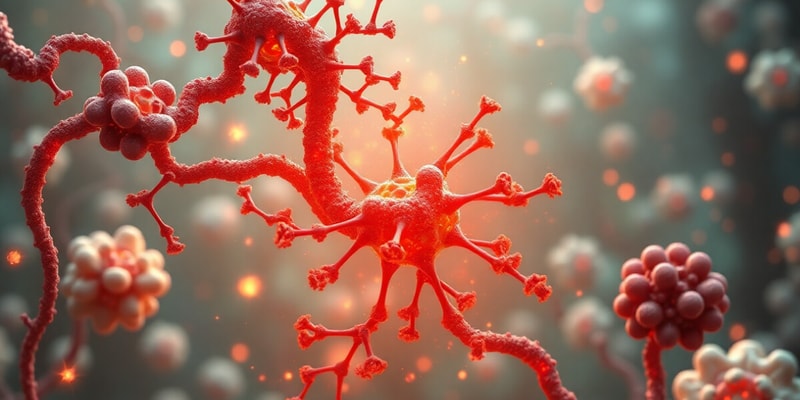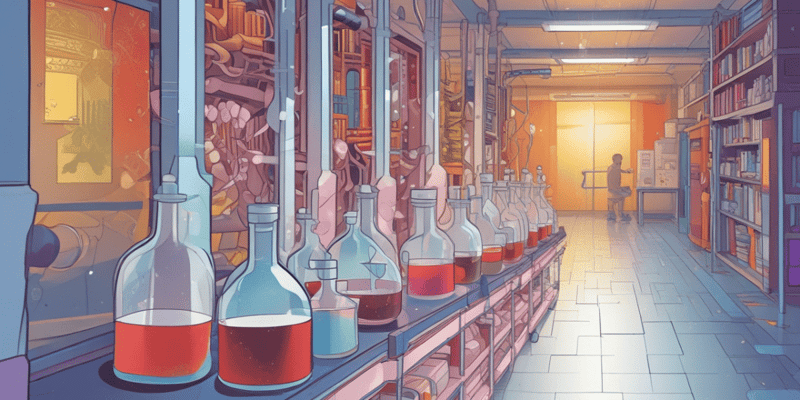Podcast Beta
Questions and Answers
What does antigenicity refer to?
What characteristic is NOT associated with immunogenic molecules?
Which type of antibody is produced in T-cell independent responses?
How do dendritic cells present antigens to naive T cells?
Signup and view all the answers
What is a polyclonal antibody?
Signup and view all the answers
What distinguishes a monoclonal antibody from a polyclonal antibody?
Signup and view all the answers
What role does IgA play in the immune system?
Signup and view all the answers
What is the overall strength of binding when multiple epitopes interact with multiple antibodies called?
Signup and view all the answers
Which class of antibody is associated with allergic reactions?
Signup and view all the answers
What are the four forces involved in Ag-Ab interactions?
Signup and view all the answers
What is the process of clonal selection?
Signup and view all the answers
What is the primary function of plasma cells?
Signup and view all the answers
What does affinity maturation refer to?
Signup and view all the answers
What occurs during antibody feedback inhibition?
Signup and view all the answers
What is opsonization?
Signup and view all the answers
What distinguishes the primary antibody response from the secondary response?
Signup and view all the answers
How do antibodies neutralize toxins?
Signup and view all the answers
What is the role of the complement system in B cell activation?
Signup and view all the answers
What defines class switching in antibody production?
Signup and view all the answers
Study Notes
Antigen-Antibody Interactions
- Antigenicity is the ability of a molecule to bind to an antibody or activated T cell.
- Immunogenicity is the ability of a molecule to elicit an immune response.
-
Characteristics of an immunogenic molecule:
- Foreignness: The molecule must be recognized as non-self by the immune system.
- High molecular weight: Larger molecules tend to be more immunogenic.
- Chemical complexity: Molecules with diverse chemical structures are better at stimulating an immune response.
- Degradability: The molecule needs to be processed and presented by antigen-presenting cells to activate T cells.
- Hapten: A small molecule that is not immunogenic by itself but becomes immunogenic when combined with a carrier molecule.
- Epitope: The specific region of an antigen that is recognized by B cells or T cells.
- MHC molecules: Present peptides from protein antigens to T cells.
- Antigens recognized by B cells independently of T cells: Lipopolysaccharides, DNA, and RNA.
-
T-cell independent responses:
- Primarily involve IgM antibody production.
- Do not lead to the formation of memory cells.
-
T-cell dependent antigen recognition:
- Involves protein antigens.
- Leads to long-term immunity.
- Results in class switching to produce IgG.
- Dendritic cells capture microbial antigens and migrate to lymph nodes to present them with MHC molecules to naive T cells.
Antibody Structure and Function
- Antibodies are proteins that can be membrane-bound or secreted.
- The variable region of an antibody binds to specific antigens.
- IgG Structure: Consists of two heavy chains and two light chains, with variable and constant regions.
- Polyclonal antibodies: Heterogeneous mixture of antibodies produced by different B cell clones recognizing various epitopes of an antigen.
- Monoclonal antibodies: Produced by a single clone of B cells, with identical affinity and specificity.
- Affinity: The strength of binding between a single epitope and an antibody.
- Avidity: The overall strength of binding when multiple epitopes interact with multiple antibodies.
-
Five classes of antibodies:
- IgG: The most abundant antibody class, involved in long-term immunity.
- IgM: The first antibody produced during an immune response.
- IgA: Found in secretions (saliva, gut, respiratory mucus), neutralizes pathogens at mucosal surfaces.
- IgE: Involved in anti-parasitic activity and Type I hypersensitivity reactions (allergies).
- IgD: Functions as part of the signaling complex on B cells.
- Forces involved in Ag-Ab interactions: Coulombic (electrostatic), van der Waals forces, hydrogen bonds, and hydrophobic interactions.
- Lattice formation: The aggregation of Ag-Ab complexes resulting in precipitation or agglutination.
B Cell Activation and Antibody Production
- Clonal selection: The process where a specific B cell is activated by an antigen, leading to its proliferation into memory and plasma cells.
- Memory cells: Provide faster response upon re-exposure to the antigen.
- Plasma cells: Secrete large amounts of antibodies specific to an antigen.
-
Antibody diversity is generated through:
- Recombination of VDJ gene segments during B cell development.
- Somatic hypermutation: Random mutations in the antibody genes introduce diversity and improve affinity.
- Class switching: A process where B cells change the class of antibody they produce (e.g., from IgM to IgG) after antigen exposure.
- Affinity maturation: The process by which the affinity of antibodies for an antigen increases through repeated exposures.
- Complement system in B cell activation: C3d binds to antigens and enhances B cell activation by linking to CR2 receptors.
- Antibody feedback inhibition: Secreted IgG antibodies form immune complexes with antigens, which inhibit further B cell activation via Fc receptors.
Antibody Functions
- Antibody-dependent cellular cytotoxicity (ADCC): Antibodies bound to infected cells are recognized by NK cells, leading to cell destruction.
- Neutralization of toxins: Blocking of toxins from binding to their target cells, preventing their harmful effects.
- Opsonization: The process by which antibodies mark pathogens for phagocytosis by immune cells.
- Secretory IgA: Neutralizes pathogens at mucosal surfaces by blocking their entry through the epithelium.
Humoral Immune Response
- Humoral immune response: The production of antibodies by B cells in response to antigens, leading to pathogen neutralization and destruction.
- Primary antibody response: Involves naive B cells producing IgM.
- Secondary antibody response: Involves memory B cells producing more IgG with higher affinity.
MHC Class I and Cell-Mediated Immunity
- MHC class I molecules: Present peptides to cytotoxic T cells (CD8+).
- Cytotoxic T cells: Destroy infected cells by releasing cytotoxic substances.
- MHC class II molecules: Present peptides to helper T cells (CD4+).
- Helper T cells: Assist B cells in antibody production and activate macrophages.
Studying That Suits You
Use AI to generate personalized quizzes and flashcards to suit your learning preferences.
Related Documents
Description
Test your knowledge on antigen-antibody interactions, focusing on antigenicity and immunogenicity. Explore key characteristics of immunogenic molecules, the role of haptens and epitopes, and the importance of MHC molecules in immune responses.




